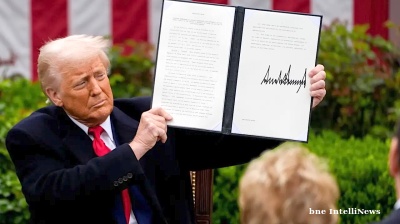Seventeen EU member states have issued a joint statement condemning Hungary’s recent legal measures that ban Budapest Pride, warning that the legislation infringes on fundamental rights and contradicts core European values.
The declaration, endorsed by countries including France, Germany, Spain, and the Nordics, was published on May 27 as EU affairs ministers met in Brussels. It urged the European Commission to deploy its full rule-of-law enforcement tools unless Budapest revises the measures.
The controversial new law on assembly passed in March will effectively prohibit public Pride events and introduce fines of up to HUF200,000 (€500) for organisers and participants, under the guise of child protection.
The Hungarian government defends the move as part of a broader effort to "protect children" and has rejected accusations of discrimination. In April, lawmakers further tightened constitutional definitions of gender, determined solely by biological sex at birth and reinforced restrictions on LGBTQ+ discourse in public spaces
The government provided the constitutional basis for curtailing the right to assembly, as the 15th amendment of the Basic Law elevated children's right to protection for their physical, intellectual, and moral development above all other fundamental rights, except the right to life.
Authorities may also deploy facial recognition technology to identify attendees. Organisers argue that this amounts to an outright ban on Budapest’s annual Pride parade, scheduled for late June.
The European Commission "has serious concerns" about the rule of law situation in Hungary and is monitoring a series of legislative developments that risk breaching the bloc’s legal and democratic standards, EU Commissioner for Democracy Michael McGrath said before the meeting.
The EC was paying close attention to developments in two infringement procedures now underway against Hungary, one concerning the Sovereignty Protection Office and the other concerning Hungary's child protection law, under which the Hungarian government is prepared to ban events such as Budapest Pride.
As for the latest development, McGrath said the EC had asked the Hungarian government to withdraw the draft law on 'transparency of public life', as its passage would violate EU law, the community's internal market freedoms, and stipulations of the Charter of Fundamental Rights.
"In the absence of that happening ... we stand ready to use the tools at our disposal," he said, adding that he hoped the Hungarian government would give a constructive response.
The legislation submitted to Parliament in mid-May, often compared to Russia’s foreign agents' law, would allow the government to monitor and potentially ban NGOs and media organisations if they receive funding from abroad and present a threat to national sovereignty.
The latter term is broadly defined in the draft legislation. This could encompass any activity that casts Hungary’s constitutional identity, Christian heritage, traditional family values or cross-border Hungarian unity in a negative light. Any act capable of influencing public opinion or democratic debate could qualify as a threat.
On Tuesday, May 27, EU Commissioner McGrath joined a renewed Article 7 hearing on Hungary at the General Affairs Council, according to leftist Nepszava.
The meeting marked the latest formal step in the EU’s Article 7 procedure against Hungary
Since 2018, when the European Parliament triggered the procedure following the Sargentini Report, Hungary has faced repeated criticism over judicial independence, media freedom, minority rights and systemic corruption. Often described as the EU’s "nuclear option," if enacted, this measure would result in the suspension of the member state’s voting rights in the Council.
"While no immediate sanctions are on the table, the meeting serves as a warning shot," one EU diplomat told financial website Portfolio.hu, reflecting a growing belief in Brussels that Hungary will not initiate meaningful domestic reform.
While the Commission is unlikely to take that step for now, it is leaning toward gradual isolation. Senior EU officials have increasingly resorted to legal instruments that bypass unanimity, including trade powers and coalition-based sanctions, to minimise the impact of Hungary’s vetoes.
The hearing also took place against the backdrop of Budapest’s continued veto of EU funding for Ukraine, which has drawn growing frustration among member states. Some EU diplomats have linked the resumption of Article 7 proceedings directly to this obstructionist stance.
The pressure on Hungary is mounting, as a group of 26 MEPs last week called for the suspension of Hungary's voting rights and EU funding. This would require unanimity in the European Council, but also consent of the European Parliament, with a two-thirds majority of votes cast, and a majority of all MEPs, or 361 votes out of 720.
By Tuesday, 329 civil groups have signed an open letter to Ursula von der Leyen and Commissioner McGrath demanding legal action against Hungary over the controversial bill, which is widely seen as a crackdown on critical voices ahead of the 2026 elections.
News

Lavrov visits North Korea to reaffirm security pact
Russian Foreign Minister Sergey Lavrov has warned the United States, South Korea and Japan against forming a trilateral security alliance that explicitly targets North Korea, cautioning that such a move would inflame regional tensions.

Trump hits EU, Mexico with whopping 30% tariffs
US President Donald Trump escalated his trade war with Mexico and Europe by slapping whopping 30% tariffs on both, after neither of them managed to cut a new trade deal before the July 9 deadline.

Israel's Netanyahu says Hamas rejected ceasefire proposal, insists on staying in Gaza
Israeli Prime Minister Benjamin Netanyahu said that Israel accepted proposals from the US for a Gaza ceasefire, but blamed Hamas for refusing to reach an agreement.

A stray drone and the shadow of war: How fear and mistrust are pushing Nato and Belarus to the brink
In today’s Europe, even a foam-and-plywood drone can trigger fighter jets, send heads of state scurrying for shelter and deepen fears of war.



